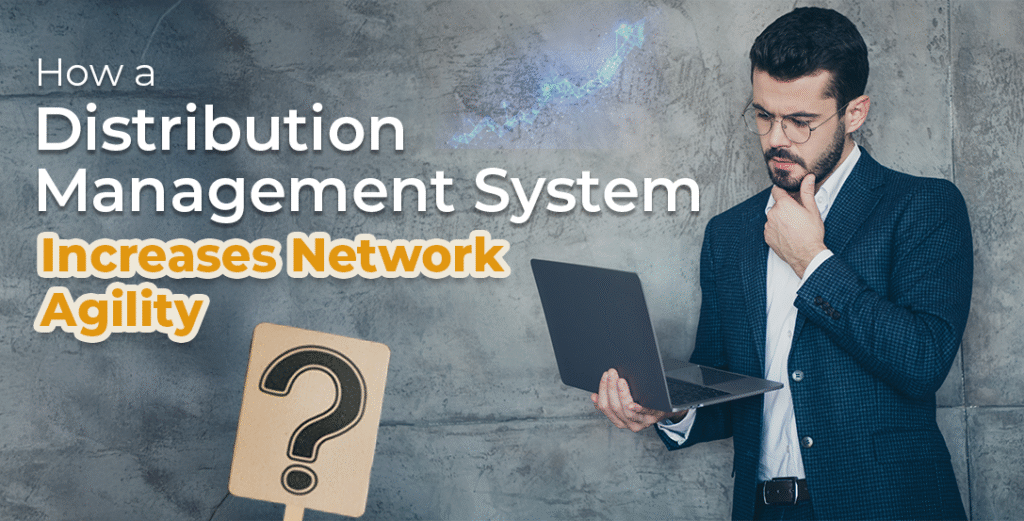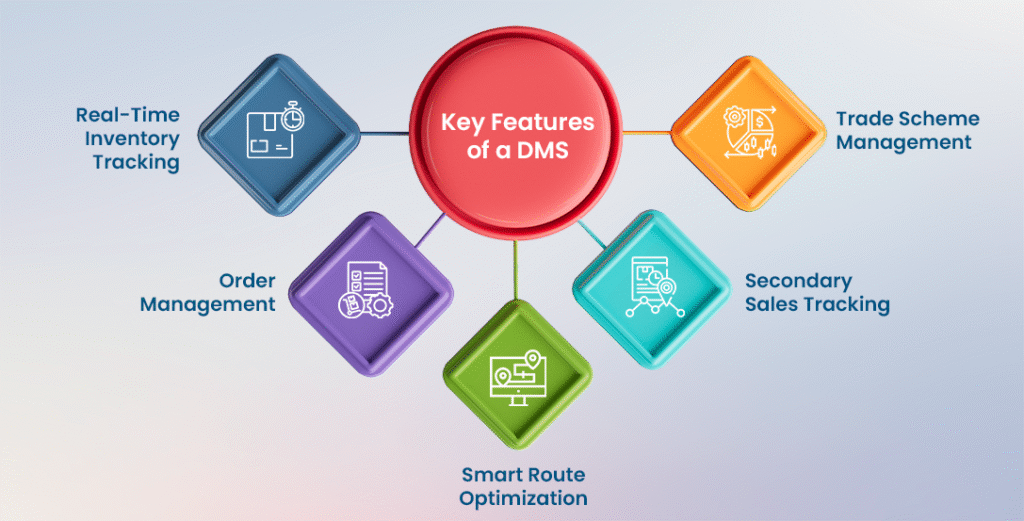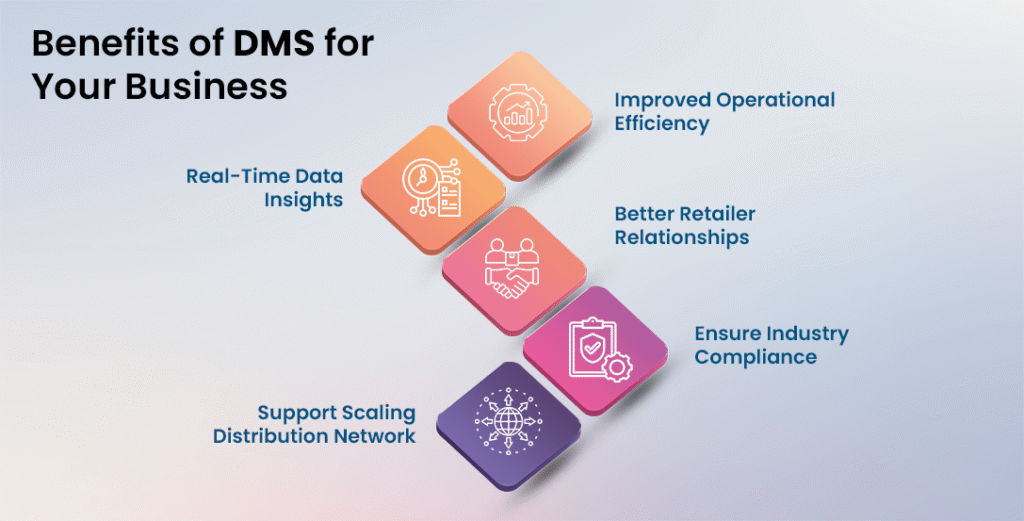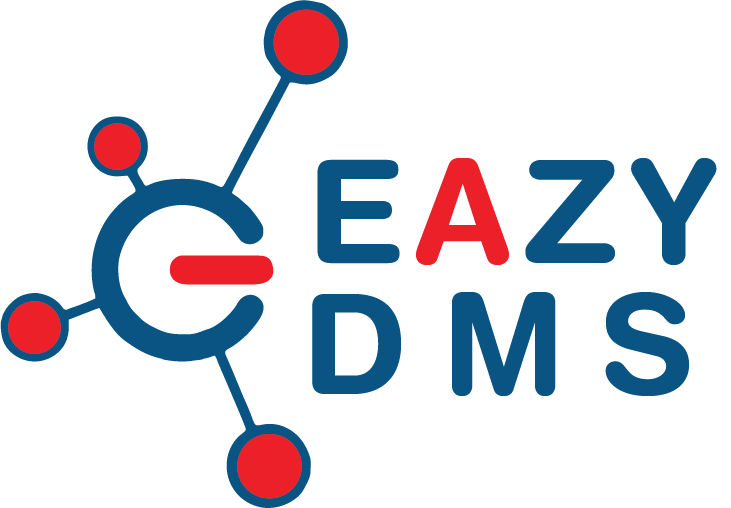
Struggling to gain real-time visibility into your distribution network? You’re not alone.
Let’s face it—managing a growing distribution network isn’t easy. One day, it’s a missed dispatch, and the next, it’s a stockout in a key market. Somewhere along the way, claim approvals pile up. Sound familiar?
That’s because traditional tools weren’t built for the kind of speed, scale, and complexity of today’s distribution demands. What you really need is a system that gives you a bird’s-eye view of your network, simplifies coordination, and helps you make faster, data-driven decisions.
That’s where a Distribution Management System (DMS) can make a real difference. From automating order flows and tracking secondary sales to resolving claims and managing trade schemes—DMS puts you in control of your entire distribution landscape.
So, What Exactly is a Distribution Management Software?
Imagine you’re managing the distribution for a popular beverage brand. You’ve got thousands of crates moving daily—from your production units to regional distributors, and finally to retailers in both metro cities and remote towns. Now, say a heatwave hits North India, and suddenly, demand spikes. But without real-time data, your local distributor runs out of stock, and by the time you react, you’ve lost valuable shelf space to a competitor.
That’s the kind of gap a Distribution Management System (DMS) is built to close.
A DMS is a powerful software platform that helps brands manage, monitor, and optimize every step of the product journey—from manufacturing to the final retail shelf. It’s not just about tracking inventory; it’s about giving you the control and visibility to make smarter, faster decisions.
Here’s what it helps with:
- Automating sales and order management
- Tracking inventory across warehouses and distributors in real time
- Managing trade schemes and promotional incentives
- Reconciling stock and returns accurately
By bringing all your distribution data onto one platform, a DMS helps ensure products reach the right market, at the right time, with the least friction. Think of it as the command center of your entire distribution ecosystem.
Let’s take a closer look at the key features that make it all happen.
The Secret to Smarter Distribution: Key Features of a DMS
A distributor management system goes beyond simply tracking products—it’s the key to streamlining your entire distribution process, from the factory floor to the end consumer. Here’s how a DMS helps brands stay in control and enhance their distribution performance:

- Real-Time Inventory Insights: Track raw materials and finished goods across all warehouses and distribution points in real-time. With automatic updates through GRNs (Goods Received Notes) and secondary sales, your inventory is always up-to-date, accurate, and ready for action.
- Dynamic Order Management: From creating new orders to modifying or canceling them, a DMS keeps you in control at all times, adjusting instantly to shifts in inventory or market demand. Orders are managed smoothly and without delay, no matter how the market fluctuates.
- End-to-End Order Fulfillment with Smart Route Optimization: From dispatch to delivery, a DMS takes care of everything. With precise order tracking, optimized route planning, and seamless GRN and invoice generation, deliveries are faster, more accurate, and more efficient.
- Secondary Sales Tracking: Capture real-time sales data from retailers and distributors, enabling automatic updates on order statuses and stock levels. This feature helps improve forecasting and drastically reduces the chances of stockouts, ensuring products are always where they’re needed most.
- Automated Trade Scheme Management: Effortlessly roll out and track trade schemes based on customer behavior, product movement, or seasonal campaigns. A DMS ensures your promotions are launched at the perfect time, boosting sales and fostering brand loyalty.
- Streamlined Sales Returns & Reverse Logistics: Whether dealing with damaged goods, expired products, or returns due to disputes, a DMS simplifies reverse logistics by maintaining traceability, automating the process, and correcting inventory discrepancies. It saves time and minimizes costly errors.
- Secure Payments & Transparent Settlements: With integrated payment processing, automated reconciliation, and clear transaction histories, your DMS ensures that financial transactions are smooth, transparent, and perfectly aligned with your distribution operations.
How a DMS Optimizes Your Distribution Network for Success?
A well-implemented Distribution Management System transforms how distribution networks operate, driving greater supply chain visibility and enhancing overall operational agility. Here are some other benefits that DMS brings to your business:

- Boosted Operational Efficiency
A Distribution Management System automates and optimizes critical processes such as order orchestration, real-time inventory synchronization, and demand forecasting. By automating workflows like Goods Receipt Notes (GRNs) and sales order management, you reduce manual errors, speed up order fulfillment, and maximize resource utilization. - Access to Real-Time Data & Insights
With a Distribution Management System , you get up-to-the-minute visibility into your entire distribution network. Whether it’s tracking stock levels, monitoring order status, or evaluating sales performance, having real-time access to data helps you make informed decisions, tackle stockouts, and address demand fluctuations swiftly. - Stronger Distributor & Retailer Relationships
A Distribution Management System centralizes all communication, making it easier to collaborate with your distributors and retailers. Sharing key data on sales performance, inventory levels, and trade schemes helps you fine-tune your distribution strategy, foster long-term partnerships, and align everyone toward shared goals. - Scalable to Support Growth
As your business expands, your Distribution Management System grows with you. Whether you’re scaling your distribution channels, adding new products, or tapping into new markets, its flexible and modular architecture ensures you’re always prepared for growth—without the headache of system upgrades or manual adjustments. - Seamless Compliance & Reporting
A DMS ensures that your distribution operations comply with industry regulations by automating documentation, reporting, and audit trails. This built-in compliance framework reduces the risk of non-compliance and keeps your operations aligned with governance standards.
By now, you’ve seen how a DMS can streamline your entire distribution network—but with countless solutions out there, how do you pick the one that fits your business?
We’ve broken down the key factors to help you zero in on a DMS that’s not just powerful, but built for your unique distribution
Your DMS Checklist: Choosing a System That Delivers Results
Not all DMS platforms are created equal—and choosing the right one can make or break your distribution network’s agility and scalability. To ensure you’re investing in a solution that truly supports your operations, here are the key factors to evaluate:
- Distribution Architecture Compatibility
Make sure the DMS aligns with your network model—whether you’re managing multi-tier supply chains, handling complex channel hierarchies, or tracking secondary and tertiary sales. - Built for Scalability
Your DMS should grow with you. Look for a platform that can easily accommodate increasing distributor counts, expanding SKUs, and geographic rollouts—without slowing down performance. - Frictionless Onboarding & Adoption
Ease of use is non-negotiable. Opt for a DMS with intuitive UI/UX, multilingual support, and mobile-first capabilities to ensure rapid adoption by on-ground sales teams and channel partners - Automated Claims & Scheme Management
Manual processes slow you down. Select a system with built-in trade claim validation, credit note automation, and dynamic scheme configuration to streamline incentive management.
If you’re searching for a solution that goes beyond the basics of just streamlining channel operations, EAZY DMS is the answer. It doesn’t simply automate processes—it transforms the way your entire distribution network operates.
Let’s take a look at how it makes your distribution network more agile.
Optimize Your Distribution Management with EAZY DMS
EAZY DMS is designed with the modern distribution ecosystem in mind, tackling operational challenges head-on while boosting agility and precision.
With a powerful suite of features, it enables manufacturers and distributors to stay ahead of the curve. Here’s what makes EAZY DMS a better solution for your business:
- Advanced Channel Visibility:
Access real-time insights into distributor stock levels, secondary sales, and retailer-specific order performance. This detailed data streamlines the supply chain, ensuring faster replenishments and minimizing stockouts. - Complete Control Over Transactions & Pricing:
The EAZY DMS portal gives full control over distributor interactions, including transparent pricing management, ledger adjustments, item modifications, and smooth handling of negative stock and backdated entries. - Intuitive User Experience for Seamless Onboarding:
With its clean, user-friendly interface, EAZY DMS ensures quick adoption across teams and partners, minimizing training time and enhancing operational efficiency from day one. - Mobile-First Design for On-the-Go Access:
The mobile app, offering both online and offline capabilities, puts real-time data in the hands of distributors and dealers—whether on the road or in the warehouse. Stay informed with up-to-the-minute stock levels, order status, and performance metrics anytime, anywhere.
Final Thought: Building a Resilient Distribution Network
An effective Distribution Management System (DMS) boosts network agility by automating critical functions like order orchestration, inventory optimization, and demand forecasting. By streamlining multi-tier distribution supply chain coordination and enhancing order fulfillment accuracy, a DMS minimizes stockouts and distribution bottlenecks.
This optimization drives operational efficiency, scalability, and responsiveness to market dynamics. Ultimately, a well-integrated Distribution Management System is key to maintaining competitive advantage and ensuring sustainable growth.
